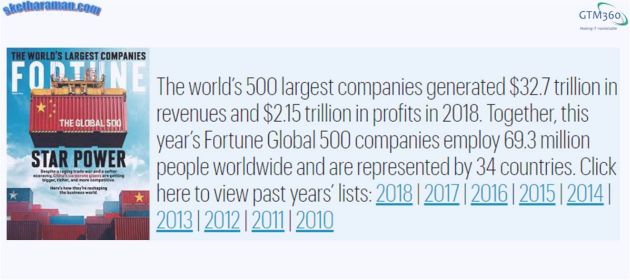After reading my post entitled TCS Is Within Striking Distance Of FORTUNE GLOBAL 500 – Even Without M&A, a friend who wishes to stay anonymous asked me the following question:
In the digital age of AirBnB, Uber and the like, does the Fortune 500 list still matter? It would also be interesting to learn how many of the original Fortune 500 companies of 1955, are still around or ranked? As for IT companies, while IBM is still ranked, revenues have been steadily declining. So is revenue the best measure?
I’m sure many others may also have the same question.
Short Answer
Fortune 500 matters. Soon it will matter even more than it does now.
Long Answer
Perhaps the publisher of FORTUNE magazine has the same question as my friend.
I’ve been reading the FORTUNE 500 and FORTUNE GLOBAL 500 issues for nearly 25 years.
For the uninitiated, Fortune 500 is the list of the 500 largest US corporations by revenues and Fortune Global 500 is a similar list but of global corporations.
In the early days, the magazine’s coverage of the top 500 companies used to be very comprehensive. I especially remember the interesting section on industry-wise rankings. Sadly, this section has been missing in the Fortune Global 500 issue for the past several years.
Going by the steadily whittling down of the Fortune Global 500 package, I’m wondering if the magazine’s publisher itself has started wondering about the relevance of Fortune 500 lists based on revenues in today’s world where market cap commands a higher share of noise.
IMO, it should not.
Market caps and other metrics are extrapolated from “samples” whereas revenue is a “pure” measure based on “population”.
You can sell 10% of your company's equity for $100M & claim $1B market cap. But you can't sell 10% of your company's output for $100M & claim $1B revenue. While market cap is an apt measure of a company's worth, revenue is a truer measure of its size. #FORTUNE500
— Ketharaman Swaminathan (@s_ketharaman) February 2, 2020
For that reason alone, I consider revenue to be the best measure of a company’s size.
Ergo revenue-based Fortune 500 lists are very much relevant even today.
Now, coming to the charge that membership on the lists is not durable, people keep making claims that many Fortune 500 companies have vanished. But I’ve never come across any proof.
Take, for example, the following tweet.
Where's the proof? What's the relevance of Mkt Value on this chart when Fortune 500 is a list of companies by Revenues??
— Ketharaman Swaminathan (@s_ketharaman) June 9, 2019
Not only does the tweeter fail to provide any evidence but he brazenly lies by showing a list of companies by market cap after claiming that 52% of companies in the revenue-based Fortune 500 list have disappeared.
I’ve tried digging deeper into this hypothesis by myself but my efforts have been in vain so far: When I last checked, Fortune’s website did not have an archive of Fortune 500 and Fortune Global 500 beyond the last 10 years. I even asked a couple of Fortune reporters I know for back issues from their physical archives but I haven’t heard back from them.
Nonetheless, it’s not impossible to believe that some Fortune 500 and Fortune Global 500 companies may have exited the respective lists over the last 20-30-40 years. But that does not make the case for a list by market cap any stronger: It’s not that companies stay on market cap lists forever.
Uber’s market cap has fallen 40% since its stock market listing. WeWork shelved its IPO plans, when its market cap fell from US$ 47B to US$ 7B in three months last year.
Market cap is so volatile that companies tumble in and out of market cap league tables in months.
It’s not widely known that Fortune had published one market cap-based list many years ago. Perhaps, as a reflection of the non-tenability of the metric, it abandoned it from the following year.
If staying power on a league table is the criteria, revenue trumps market cap hands down.
If we see a few more market cap debacles like Uber, WeWork, Lyft and Slack, I can bet that revenue will not only cement its current position as the best measure of a company’s size but will also regain its past glory as the most accurate yardstick of a company’s clout and dominance.
That said, revenue should not be the only basis of ranking companies. And, it is not.
FORTUNE itself publishes many other annual league tables like “fastest growing companies”, “most admired companies” and “best companies to work for”.
